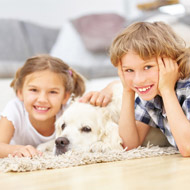
Research supports growing evidence on the benefits of pets
Children have more satisfying relationships with their pets than they do with their siblings, according to new research.
The study, published in the Journal of Applied Developmental Psychology, also found that children get on better with companion animals than their brothers and sisters.
Researchers say this builds on evidence that pets could influence child development and have a positive impact on social skills and emotional well-being.
“Anyone who has loved a childhood pet knows that we turn to them for companionship and disclosure, just like relationships between people,” says lead researcher Matt Cassels from the University of Cambridge.
“We wanted to know how strong these relationships are with pets relative to other close family ties. Ultimately this may enable us to understand how animals contribute to healthy child development.”
In the study, researchers surveyed 12-year-olds from 77 families with more than one child and one or more pets of any kind. The children reported strong relationships with their pets relative to their brothers and sisters. Owners of dogs also reported lower levels of conflict and greater satisfaction.
Cassels explains that even though pets may not understand or respond verbally, the level of disclosure to pets was no less than to siblings. He added that the fact pets cannot understand or talk back may even be a benefit as it means they are completely non-judgmental.
The study found that while boys and girls were equally satisfied with their pets, girls reported more disclosure, companionship and conflict. This goes against previous research, which often found that boys report stronger relationships with their pets than girls.
“Evidence continues to grow showing that pets have positive benefits on human health and community cohesion,” says co-author Nancy Gee from the WALTHAM Centre for Pet Nutrition.
“The social support that adolescents receive from pets may well support psychological well-being later in life but there is still more to learn about the long-term impact of pets on children’s development”.
Image (C) Freuds



 The latest
The latest